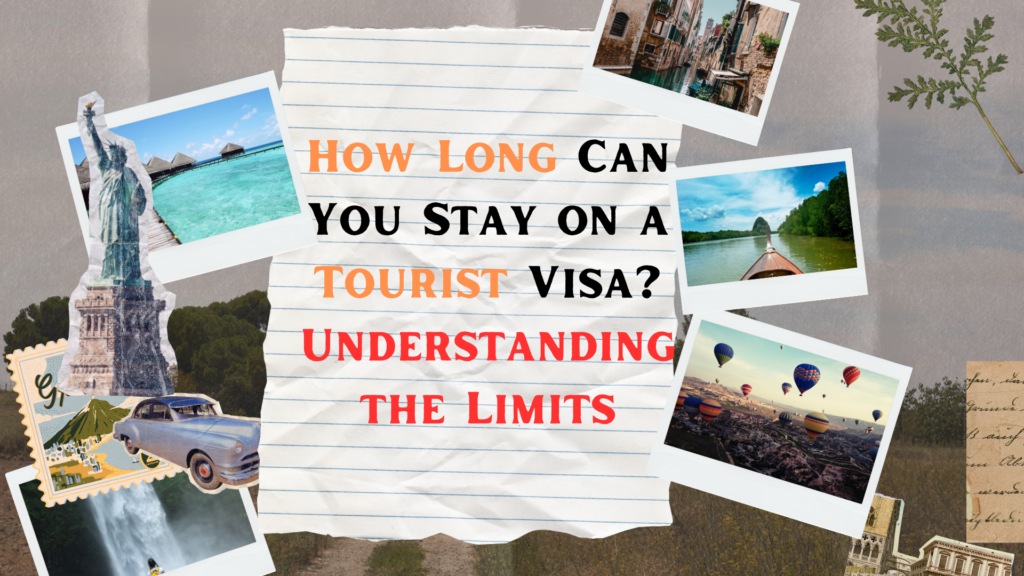
Traveling overseas is a thrilling adventure, but it’s important to understand the regulations pertaining to tourist visas, such as the maximum duration of stay. If you overstay your visa, you may be fined, deported, or even prohibited from traveling in the future. In order to guarantee a seamless and legal visit, this article seeks to dissect the several elements that affect the duration of stay on a tourist visa.
A tourist visa is a type of travel authorization that permits people to enter a foreign nation for a brief stay, usually for tourism, pleasure, or to see friends and relatives. Tourist visas expressly forbid employment or prolonged stays, in contrast to work or student visas.
Factors That Determine Length of Stay
1] Country Regulations
The nation issuing the visa determines the duration of stay.
USA (B2 Visa) : Per admission, up to six months are permitted.
Schengen Visa (Europe): 90 days at most during a 180-day span
UK Standard Visitor Visa: Depending on the type of visa granted, up to six months.
2] Single vs. Multiple Entry Visas
While some visas only allow one entry, others allow several entries over a predetermined time frame. A Schengen visa, for instance, permits several visits, although the total stay cannot be longer than ninety days.
3] Immigration Officer Discretion
At the time of entrance, the immigration officer frequently determines the precise length of your stay. Depending on your travel schedule, the officer may allow a shorter stay even though your visa is valid for six months.
4] Visa-Free Travel Arrangements
Certain nations permit short-term visa-free travel, including.
Japan : permits a 30- to 90-day visa-free stay for many passport holders.
Thailand: allows numerous nationalities to enter without a visa for 30 days.
5] Extensions and Overstay Policies
Many nations provide visa extensions for valid reasons (such as unanticipated medical conditions), but you must apply for one before your current visa expires. Penalties may arise from overstaying.
Fines (For instance, overstayers in Thailand face fines of about $15 per day.(₹ 1,269.))
Blacklisting (Schengen nations, for instance, may prohibit travel.)
6] Schengen Visa’s 90/180 Rule Explained
According to the rule, you may remain for a maximum of 90 days throughout any 180-day term. Make sure your stays don’t go above this cumulative cap if you travel frequently.
To keep track of your days, use visa trackers and calculators, particularly in areas with complicated regulations like the Schengen Area.
On the Visa Stamp/Sticker: The number of days permitted, the expiration date, and the entry requirements are often listed on your visa.
Ask at Immigration: A stamped date that indicates when you must depart is frequently provided by immigration officers.
Consult Official Resources : Always check your destination’s official immigration website.
1] Plan Your Stay Wisely: Make sure your travel schedule doesn’t conflict with the allotted time.
2] Keep Track of Days: For Schengen or comparable areas, use calendar tools or visa calculators.
3] Request Extensions in Advance: Before your visa expires, seek for an extension if you think you’ll need extra time.
4] Understand Re-Entry Rules: Even with several entries, be sure you don’t go over the 90/180 rule in areas like Schengen.
Special Cases
Emergency Extensions : Certain nations permit emergency extensions for unforeseen events, such health problems.
Frequent Travelers : If you frequently travel to the same nation, think about getting a multi-entry visa or a long-term visitor permit.
It’s important to know the duration restrictions of a tourist visa in order to ensure a stress-free and pleasurable trip, not merely to comply with regulations. Understanding the specific laws of each nation will help you steer clear of issues like fines, travel bans, and overstaying penalties. Effectively managing your travel schedule requires careful planning, keeping abreast with visa regulations, and utilizing resources like visa trackers.
Keep in mind that following visa requirements protects your future travel opportunities and demonstrates respect for the laws of the host nation. Consult experts or get in touch with local embassies if you have any questions regarding any part of your visa. Make the most of your trips, travel wisely, and keep yourself informed! Have a safe trip!
